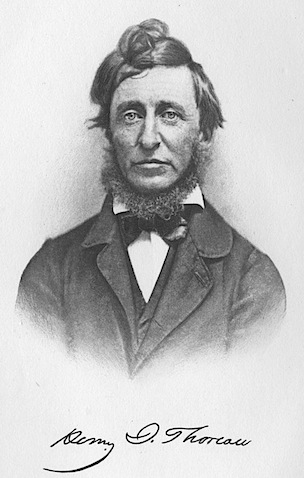We Should Go Forth

“We should go forth on the shortest walk, perchance in the spirit of undying adventure, never to return – sending back our embalmed hearts only as relics to our desolate kingdoms.”
–Henry David Thoreau (American Essayist and Philosopher, 1817-1862)
The True and the Sublime

“In eternity there is indeed something true and sublime. But all these times and places and occasions are now and here. God himself culminates in the present moment and will never be more divine in the lapse of the ages. Time is but a stream I go a-fishing in. I drink at it, but when I drink I see the sandy bottom and detect how shallow it is. Its thin current slides away but eternity remains.”
–Henry David Thoreau (American Essayist and Philosopher, 1817-1862)
Acting On Your Dreams

“I learned this, at least by my experiment: that if you advance confidently in the direction of your dreams, and endeavor to live the life which you have imagined, you will meet with a success unexpected in common hours.
You will put some things behind, you will pass an invisible boundary; new, universal and more liberal laws will begin to establish themselves around and within you; or the old laws will be expanded, and interpreted in your favor in a more liberal sense, and you will live with the license of a higher order of beings. In proportion as you simplify your life, the laws of the universe will appear less complex, and solitude will not be solitude, nor poverty, nor weakness.
If you have built castles in the air, your work need not be lost, that is what they should be. Now put foundations under them.”
–Henry David Thoreau (American Essayist and Philosopher, 1817-1862)
Learning to Reawaken

“We must learn to reawaken and keep ourselves awake, not by mechanical aid, but by an infinite expectation of the dawn.”
–Henry David Thoreau (American Essayist and Philosopher, 1817-1862)
Dream, Focus, Act and Simplify

“I learned this, at least by my experiment: that if you advance confidently in the direction of your dreams, and endeavor to live the life which you have imagined, you will meet with a success unexpected in common hours.
You will put some things behind, you will pass an invisible boundary; new, universal and more liberal laws will begin to establish themselves around and within you; or the old laws will be expanded, and interpreted in your favor in a more liberal sense, and you will live with the license of a higher order of beings. In proportion as you simplify your life, the laws of the universe will appear less complex, and solitude will not be solitude, nor poverty, nor weakness.
If you have built castles in the air, your work need not be lost, that is what they should be. Now put foundations under them.”
–Henry David Thoreau (American Essayist and Philosopher, 1817-1862)
Music, Language and the Brain

For more than two centuries neurologists and others interested in music and language have wondered whether or not language and music depend on common processes in the mind. It has been known that some aspects of language and music are represented in different regions of the brain, but there are also many areas of crossover.
Now, researchers at Georgetown University Medical Center have published evidence in the journal NeuroImage, that the processing of music and language do indeed depend on some of the same brain systems.
Their findings suggest that two different aspects of both music and language depend on the same two memory systems in the brain. One brain system, based in the temporal lobes, helps us to memorize information in both language and music, for example words and meanings in language and familiar melodies in music. The other memory system is focused in the frontal lobes, and this one helps us to learn “unconsciously” and use the rules that underlie both language and music, such as the rules of syntax in sentences, and the rules of harmony in music.
The study involved 64 adults and the researchers used a technique called event-related potentials, in which they measured the brain’s electrical activity using electrodes placed on the scalp.
The subjects listened to 180 snippets of melodies. Half of the melodies were segments from tunes that most participants would know, such as “Three Blind Mice” and “Twinkle, Twinkle Little Star.” The other half included novel tunes composed by one of the researchers. Three versions of each well-known and novel melody were created: melodies containing an in-key deviant note that could only be detected if the melody was familiar, and therefore memorized; melodies that contained an out-of-key deviant note that violated rules of harmony; the original melodies that acted as the “controls”
They found that violations of rules and memory in music corresponded to the two patterns of brain waves seen in previous studies of rule and memory violations in language. In-key violations of familiar melodies led to a brain-wave pattern similar to one called an “N400” that has previously been found with violations of words. One example that the authors gave: :I’ll have my coffee with milk and concrete.” Out-of-key violations of both familiar and novel melodies generated electrical activity over the frontal lobe similar to the patterns previously found for violations of rules in both language and music. Out-of-key violations of familiar melodies also led to an N400-like pattern of brain activity, as expected because these are violations of memory as well as rules.
This research opens up new ways of thinking about the relationships between language and music, and may have implications for speech and language therapy.
“When I hear music, I fear no danger. I am invulnerable. I see no foe. I am related to the earliest times, and to the latest.”
–Henry David Thoreau (American Essayist and Philosopher, 1817-1862)
“There is nothing better than music as a means for uplifting the soul.”
–Hazrat Inayat Khan (Founder of the Sufi Order of the West, 1882-1927)
“There are more love songs than anything else. If songs could make you do something we’d all love one another.”
–Frank Zappa (American Composer, Guitarist, Satirist and Song Writer, 1940-1993)
“Since music is a language with some meaning at least for the immense majority of mankind, although only a tiny minority of people are capable of formulating a meaning in it, and since it is the only language with the contradictory attributes of being at once intelligible and untranslatable, the musical creator is a being comparable to the gods, and music itself the supreme mystery of the science of man, a mystery that all the various disciplines come up against and which holds the key to their progress.”
–Claude Lévi-Strauss (Belgian-born French Social Anthropologist, 1908-)






